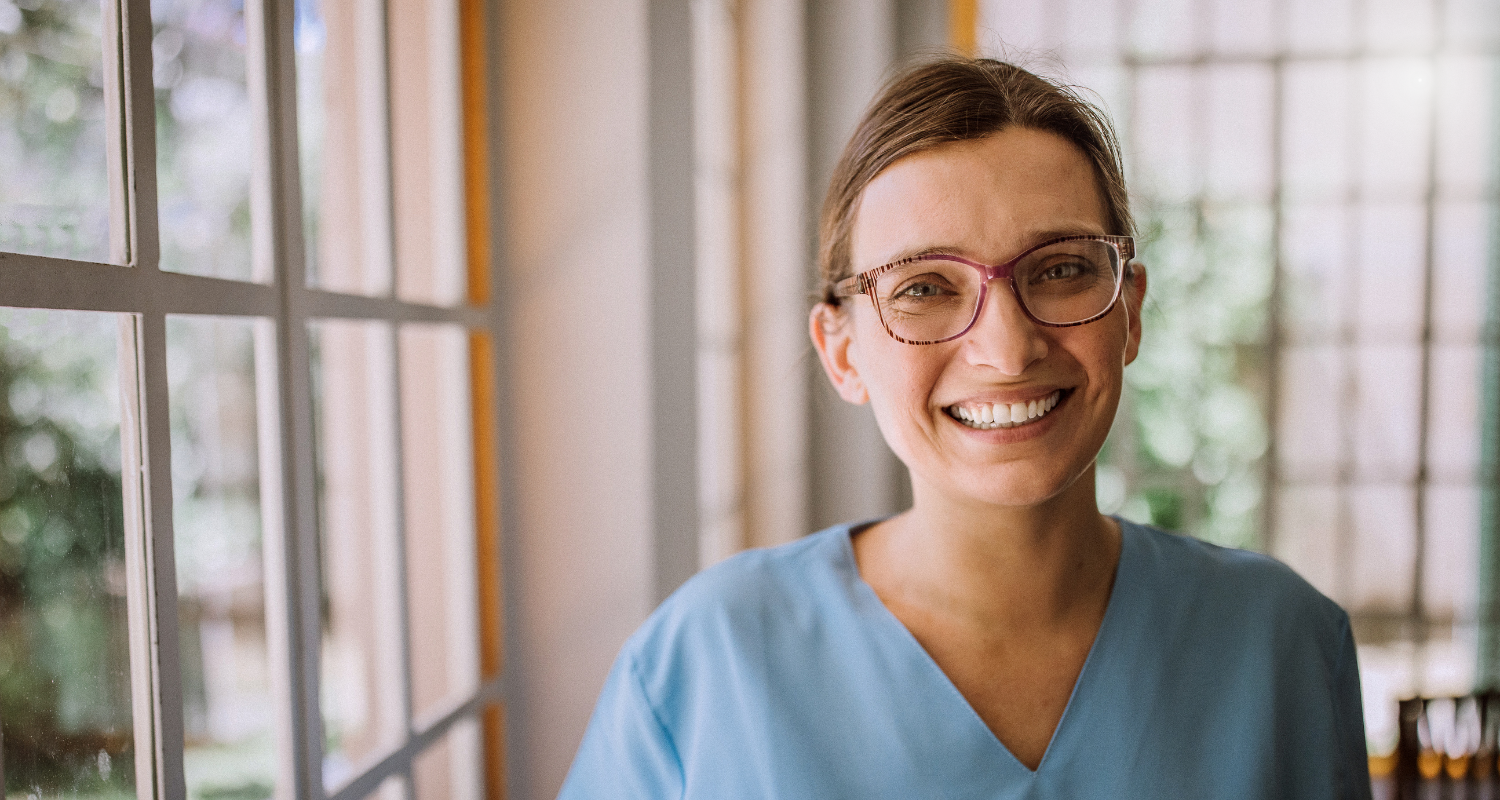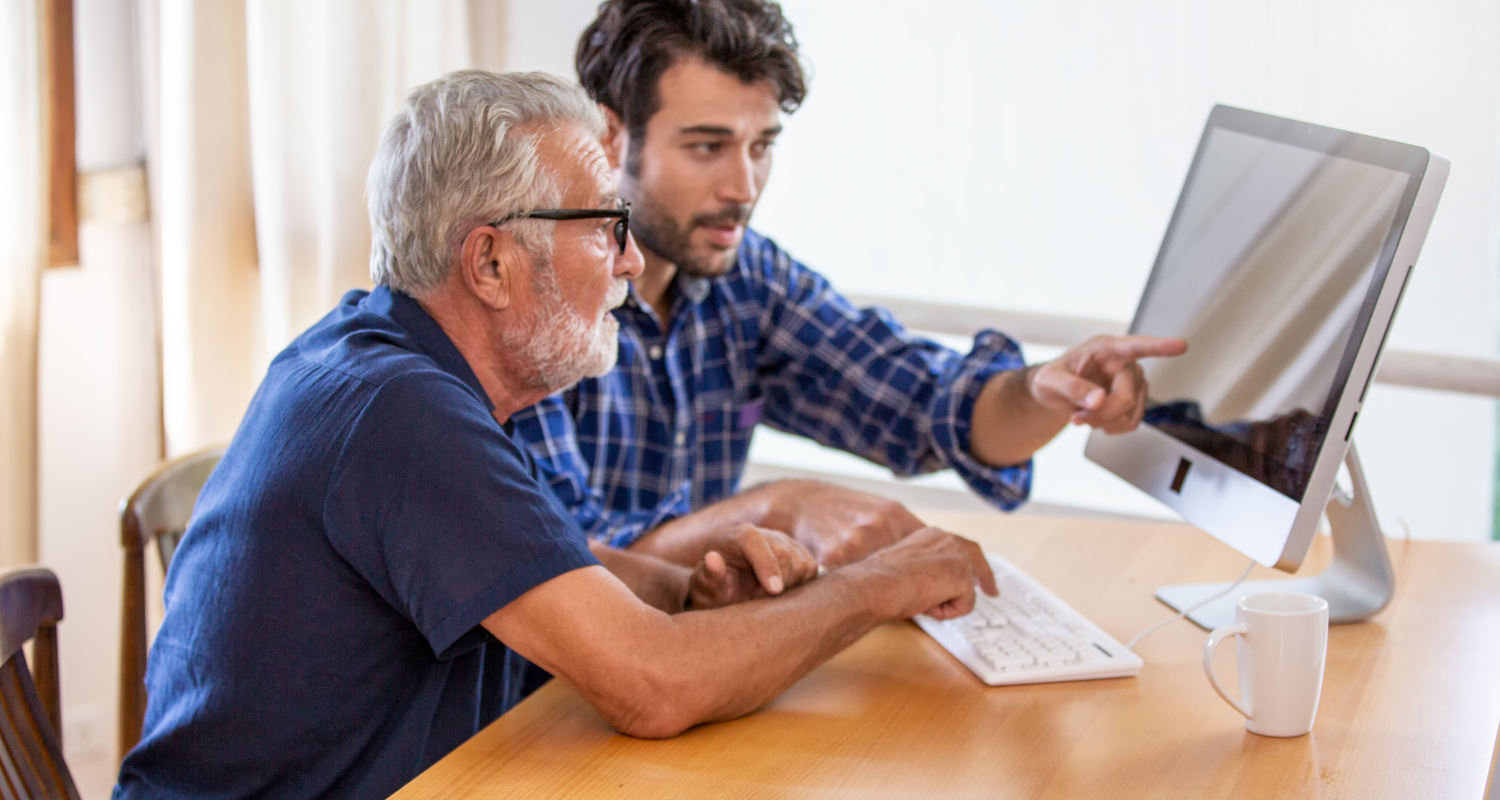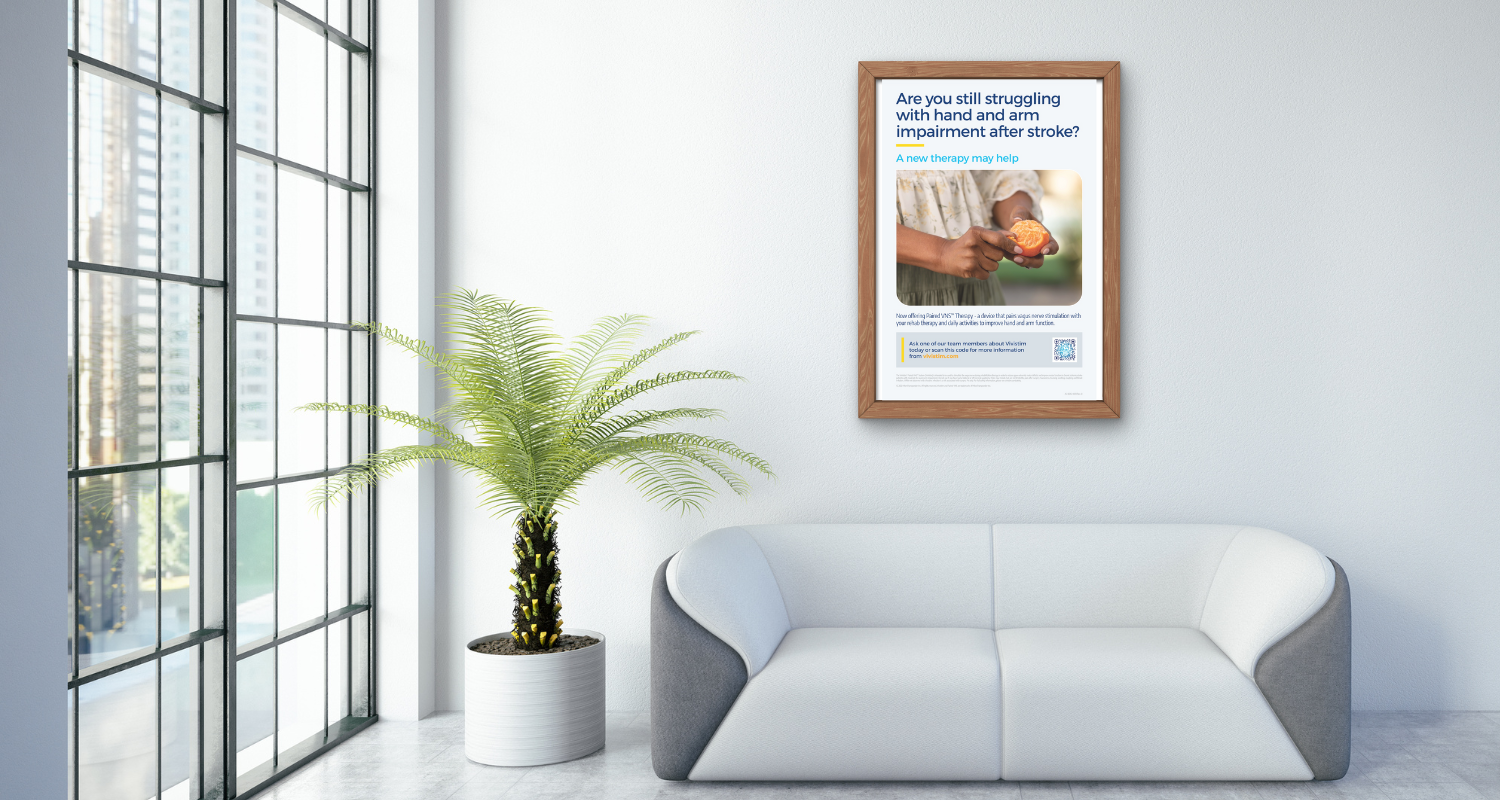Clinical & Support Resources
Resources designed to boost your clinical confidence and patient support

Clinical Navigators
Our Clinical Navigators, all registered nurses, play a crucial role in guiding patients through the Vivistim Therapy journey. Specializing in stroke care and rehabilitation, they are dedicated to ensuring smooth communication and coordination between patients, caregivers, and healthcare providers.
Connect potential patients with a Clinical Navigator
Therapy Development Specialists
Occupational Therapists and Physical Therapists by training, our Therapy Development Specialists are dedicated to optimizing clinical outcomes and satisfaction for our patients, therapists, physicians, and healthcare partners. They provide training on Vivistim Therapy, educate patients and caregivers, and address any questions related to its clinical use.
Request a call from a Vivistim Rep in your area
Pre-Service Clearance Assistance
The Vivistim Pre-Service Clearance Program is designed to support patients and their provider’s office in navigating the insurance process. Our program assists with securing prior authorization or pre-certification, ensuring that all necessary approvals are obtained before the start of Vivistim Therapy. This service helps to streamline the prior authorization process, minimize delays, and provide peace of mind to both patients and healthcare providers.
Access our reimbursement guide
Consumer Awareness
We’ve invested in advertising, including social media and sponsorships, to boost public awareness and demand while focusing on the provider-patient relationship and supporting the stroke survivor community.
| Visit us on Facebook | Visit us on Instagram |
| Visit us on Twitter | Visit us on LinkedIn |

Marketing Materials Support
In addition to investing in consumer marketing programs to drive patients to your office, we offer in-office marketing materials, social media assets, and digital resources to help generate interest and conversations about Vivistim Therapy.
Paired Vagus Nerve Stimulation for Stroke Bibliography
The following bibliography is a list of peer-reviewed publications related to the clinical use of Paired VNS for the treatment of chronic stroke and its mechanisms of action. This bibliography is not intended to be a comprehensive list of every publication on the subject. This list does not include applications for Paired VNS that have been studied outside of stroke except where mechanism of action may overlap. The bibliography was compiled through PubMed and provides links to the journal articles referenced. Book chapters, abstracts, and posters are not included.
The MicroTransponder® Vivistim® Paired VNS™ System is intended to be used to stimulate the vagus nerve during rehabilitation therapy in order to reduce upper extremity motor deficits and improve motor function in chronic ischemic stroke patients with moderate to severe arm impairment.
Clinical Studies
- Vora I, Gochyyev P, Engineer N, Wolf SL, Kimberley TJ. (May 2024) Distal Versus Proximal Arm Improvement After Paired Vagus Nerve Stimulation Therapy After Chronic Stroke. Arch Phys Med Rehabil, 28:S0003-9993(24)01014-1. doi: 10.1016/j.apmr.2024.05.018.
- Cummins DD, Kalagara R, Downes MH, et al. (March 2024) Vagus nerve stimulation for enhanced stroke recovery after intracerebral hemorrhage: illustrative case. J Neurosurg Case Lessons. 11;7(11): CASE23676 doi: 10.3171/CASE23676
- Malakouti N, Serruya MD, Cramer SC, et al. (Feb 2024) Making Sense of Vagus Nerve Stimulation for Stroke. Stroke, 55(2), 519-522. doi: 10.1161/STROKEAHA.123.044576
- Kimberley TK, Prudente CN, Engineer ND, et al. (September 2023) Vagus Nerve Stimulation Paired with Mobility Training in Chronic Ischemic Stroke: A Case Report. Phys Ther, in press.
doi: 10.1093/ptj/pzad097 - Dawson J, Engineer ND, Cramer SC, et al. (June 2023) Vagus Nerve Stimulation Paired With Rehabilitation for Upper Limb Motor Impairment and Function After Chronic Ischemic Stroke: Subgroup Analysis of the Randomized, Blinded, Pivotal, VNS-REHAB Device Trial. Neurorehabilitation and Neural Repair, 37(6) 367-373. doi: 10.1177/15459683221129274
- Francisco GE, Engineer N, Dawson J, et al. (March 2023) Vagus Nerve Stimulation Paired with Upper-Limb Rehabilitation After Stroke: Two- and Three-Year Follow-up from the Pilot Study. Arch Phys Med Rehabil, 104(8), 1180-1187. doi.org/10.1016/j.apmr.2023.02.012
- Liu CY, Russin J, Adelson DP, et al. (September 2022). Vagus nerve stimulation paired with rehabilitation for stroke: Implantation experience from the VNS-REHAB trial. Journal of Clinical Neuroscience 105, 122–128. https://doi.org/10.1016/j.jocn.2022.09.013
- Dawson J, Liu CY, Francisco GE, et al. (April 2021). Vagus nerve stimulation paired with rehabilitation for upper limb motor function after ischaemic stroke (VNS-REHAB): a randomised, blinded, pivotal, device trial. Lancet, 397(10284), 1545–1553. https://doi.org/10.1016/S0140-6736(21)00475-X
- Dawson J, Engineer ND, Prudente CN, et al. (June 2020). Vagus Nerve Stimulation Paired With Upper-Limb Rehabilitation After Stroke: One-Year Follow-up. Neurorehabilitation and Neural Repair, 34(7), 609–615. https://doi.org/10.1177/1545968320924361
- Dickie DA, Kimberley TJ, Pierce D, et al. (November 2019). An Exploratory Study of Predictors of Response to Vagus Nerve Stimulation Paired with Upper-Limb Rehabilitation After Ischemic Stroke. Scientific Reports, 9(1), 15902. https://doi.org/10.1038/s41598-019-52092-x
- Kimberley TJ, Prudente CN, Engineer ND, et al. (June 2019). Study protocol for a pivotal randomised study assessing vagus nerve stimulation during rehabilitation for improved upper limb motor function after stroke. European Stroke Journal, 4(4), 363–377. https://doi.org/10.1177/2396987319855306
- Kimberley TJ and Dawson J. (January 2019). Response by Kimberley and Dawson Regarding Article, “Vagus Nerve Stimulation Paired With Upper Limb Rehabilitation After Chronic Stroke: A Blinded Randomized Pilot Study”. Stroke, 50(2), e38. https://doi.org/10.1161/STROKEAHA.118.024405
- Kumaria A and Tolias CM. (January 2019). Letter by Kumaria and Tolias Regarding Article, “Vagus Nerve Stimulation Paired With Upper Limb Rehabilitation After Chronic Stroke: A Blinded Randomized Pilot Study”. Stroke, 50(2), e37. https://doi.org/10.1161/STROKEAHA.118.024182
- Kimberley TJ, Pierce D, Prudente CN, et al. (September 2018). Vagus Nerve Stimulation Paired With Upper Limb Rehabilitation After Chronic Stroke. Stroke, 49(11), 2789–2792. https://doi.org/10.1161/STROKEAHA.118.022279
- Kilgard MP, Rennaker RL, Alexander J, and Dawson J. (March 2018). Vagus nerve stimulation paired with tactile training improved sensory function in a chronic stroke patient. NeuroRehabilitation, 42(2), 159–165. https://doi.org/10.3233/NRE-172273
- Dawson J, Pierce D, Dixit A, et al. (January 2016). Safety, Feasibility, and Efficacy of Vagus Nerve Stimulation Paired With Upper-Limb Rehabilitation After Ischemic Stroke. Stroke, 47(1), 143–150. https://doi.org/10.1161/STROKEAHA.115.010477
Review Articles
- Dawson J, and Abdul-Rahim AH. (April 2022). Paired vagus nerve stimulation for treatment of upper extremity impairment after stroke. International Journal of Stroke: Official Journal of the International Stroke Society, 17(10), 1061-1066. https://doi.org/10.1177/17474930221094684
- Morrison RA, Hays SA, and Kilgard MP. (August 2021). Vagus Nerve Stimulation as a Potential Adjuvant to Rehabilitation for Post-stroke Motor Speech Disorders. Frontiers in Neuroscience, 15, 715928. https://doi.org/10.3389/fnins.2021.715928
- Engineer ND, Kimberley TJ, Prudente CN, et al. (March 2019). Targeted Vagus Nerve Stimulation for Rehabilitation After Stroke. Frontiers in Neuroscience, 13, 280. https://doi.org/10.3389/fnins.2019.00280
- Hays SA. (January 2016). Enhancing Rehabilitative Therapies with Vagus Nerve Stimulation. Neurotherapeutics : the Journal of the American Society for Experimental NeuroTherapeutics, 13(2), 382–394. https://doi.org/10.1007/s13311-015-0417-z
Pre-Clinical Publications / MOA
- Bowles S, Hickman J, Peng X, et al. (September 2022). Vagus nerve stimulation drives selective circuit modulation through cholinergic reinforcement. Neuron, S0896-6273(22)00555-4. https://doi.org/10.1016/j.neuron.2022.06.017
- Rodenkirch C, Carmel JB, and Wang Q. (July 2022). Rapid Effects of Vagus Nerve Stimulation on Sensory Processing Through Activation of Neuromodulatory Systems. Frontiers in Neuroscience, 16, 922424. https://doi.org/10.3389/fnins.2022.922424
- Morrison RA, Abe ST, Danaphongse T, et al. (February 2022). Common Cholinergic, Noradrenergic, and Serotonergic Drugs Do Not Block VNS-Mediated Plasticity. Frontiers in Neuroscience, 16, 849291. https://doi.org/10.3389/fnins.2022.849291
- Tseng CT, Gaulding SJ, Dancel C, and Thorn CA. (November 2021). Local activation of α2 adrenergic receptors is required for vagus nerve stimulation induced motor cortical plasticity. Scientific Reports, 11(1), 21645. https://doi.org/10.1038/s41598-021-00976-2
- Kunii N, Koizumi T, Kawai K, Shimada S, and Saito N. (August 2021). Vagus Nerve Stimulation Amplifies Task-Induced Cerebral Blood Flow Increase. Frontiers in Human Neuroscience, 15, 726087. https://doi.org/10.3389/fnhum.2021.726087
- Brougher J, Sanchez CA, Aziz US, et al. (August 2021). Vagus Nerve Stimulation Induced Motor Map Plasticity Does Not Require Cortical Dopamine. Frontiers in Neuroscience, 15, 693140. https://doi.org/10.3389/fnins.2021.693140
- Pruitt DT, Danaphongse TT, Lutchman M, et al. (June 2021). Optimizing Dosing of Vagus Nerve Stimulation for Stroke Recovery. Translational Stroke Research, 12(1), 65–71. https://doi.org/10.1007/s12975-020-00829-6
- Morrison RA, Danaphongse TT, Abe ST, et al. (April 2021). High intensity VNS disrupts VNS-mediated plasticity in motor cortex. Brain Research, 1756, 147332. https://doi.org/10.1016/j.brainres.2021.147332
- Darrow MJ, Mian TM, Torres M, et al. (January 2021). The tactile experience paired with vagus nerve stimulation determines the degree of sensory recovery after chronic nerve damage. Behavioural Brain Research, 396, 112910. https://doi.org/10.1016/j.bbr.2020.112910
- Morrison RA, Danaphongse TT, Pruitt DT, et al. (August 2020). A limited range of vagus nerve stimulation intensities produce motor cortex reorganization when delivered during training. Behavioural Brain Research, 391, 112705. https://doi.org/10.1016/j.bbr.2020.112705
- Darrow MJ, Torres M, Sosa MJ, et al. (January 2020). Vagus Nerve Stimulation Paired with Rehabilitative Training Enhances Motor Recovery After Bilateral Spinal Cord Injury to Cervical Forelimb Motor Pools. Neurorehabilitation and Neural Repair, 34(3), 200–209. https://doi.org/10.1177/1545968319895480
- Darrow MJ, Mian TM, Torres M, et al. (January 2020). Restoration of Somatosensory Function by Pairing Vagus Nerve Stimulation with Tactile Rehabilitation. Annals of Neurology, 87(2), 194–205. https://doi.org/10.1002/ana.25664
- Hulsey DR, Shedd CM, Sarker SF, et al. (October 2019). Norepinephrine and serotonin are required for vagus nerve stimulation directed cortical plasticity. Experimental Neurology, 320, 112975. https://doi.org/10.1016/j.expneurol.2019.112975
- Morrison RA, Hulsey DR, Adcock KS, et al. (March 2019). Vagus nerve stimulation intensity influences motor cortex plasticity. Brain Stimulation, 12(2), 256–262. https://doi.org/10.1016/j.brs.2018.10.017
- Meyers EC, Solorzano BR, James J, et al. (January 2018). Vagus Nerve Stimulation Enhances Stable Plasticity and Generalization of Stroke Recovery. Stroke, 49(3), 710–717. https://doi.org/10.1161/STROKEAHA.117.019202
- Hays SA, Ruiz A, Bethea T, et al. (July 2016). Vagus nerve stimulation during rehabilitative training enhances recovery of forelimb function after ischemic stroke in aged rats. Neurobiology of Aging, 43, 111–118. https://doi.org/10.1016/j.neurobiolaging.2016.03.030
- Pruitt DT, Schmid AN, Kim LJ, et al. (April 2016). Vagus Nerve Stimulation Delivered with Motor Training Enhances Recovery of Function after Traumatic Brain Injury. Journal of Neurotrauma, 33(9), 871–879. https://doi.org/10.1089/neu.2015.3972
- Hulsey DR, Hays SA, Khodaparast N, et al. (March 2016). Reorganization of Motor Cortex by Vagus Nerve Stimulation Requires Cholinergic Innervation. Brain Stimulation, 9(2), 174–181. https://doi.org/10.1016/j.brs.2015.12.007
- Khodaparast N, Kilgard MP, Casavant R, et al. (January 2016). Vagus Nerve Stimulation During Rehabilitative Training Improves Forelimb Recovery After Chronic Ischemic Stroke in Rats. Neurorehabilitation and Neural Repair, 30(7), 676–684. https://doi.org/10.1177/1545968315616494
- Hays SA, Khodaparast N, Hulsey DR, et al. (August 2014). Vagus nerve stimulation during rehabilitative training improves functional recovery after intracerebral hemorrhage. Stroke, 45(10), 3097–3100. https://doi.org/10.1161/STROKEAHA.114.006654
- Hays SA, Khodaparast N, Ruiz A, et al. (June 2014). The timing and amount of vagus nerve stimulation during rehabilitative training affect poststroke recovery of forelimb strength. Neuroreport, 25(9), 676–682. https://doi.org/10.1097/WNR.0000000000000154
- Khodaparast, N., Hays, S. A., Sloan, A. M., Fayyaz, T., Hulsey, D. R., Rennaker, R. L., 2nd, & Kilgard, M. P. (February 2014). Vagus nerve stimulation delivered during motor rehabilitation improves recovery in a rat model of stroke. Neurorehabilitation and Neural Repair, 28(7), 698–706. https://doi.org/10.1177/1545968314521006
- Khodaparast, N., Hays, S. A., Sloan, A. M., Hulsey, D. R., Ruiz, A., Pantoja, M., Rennaker, R. L., 2nd, & Kilgard, M. P. (December 2013). Vagus nerve stimulation during rehabilitative training improves forelimb strength following ischemic stroke. Neurobiology of Disease, 60, 80–88. https://doi.org/10.1016/j.nbd.2013.08.002
- Hays, S. A., Rennaker, R. L., & Kilgard, M. P. (2013). Targeting plasticity with vagus nerve stimulation to treat neurological disease. Progress in Brain Research, 207, 275–299. https://doi.org/10.1016/B978-0-444-63327-9.00010-2
- Porter, B. A., Khodaparast, N., Fayyaz, T., Cheung, R. J., Ahmed, S. S., Vrana, W. A., Rennaker, R. L., 2nd, & Kilgard, M. P. (October 2012). Repeatedly pairing vagus nerve stimulation with a movement reorganizes primary motor cortex. Cerebral Cortex, 22(10), 2365–2374. https://doi.org/10.1093/cercor/bhr316
- Engineer, N. D., Riley, J. R., Seale, J. D., Vrana, W. A., Shetake, J. A., Sudanagunta, S. P., Borland, M. S., & Kilgard, M. P. (January 2011). Reversing pathological neural activity using targeted plasticity. Nature, 470(7332), 101–104. https://doi.org/10.1038/nature09656
81-0007-0002 Rev. 3